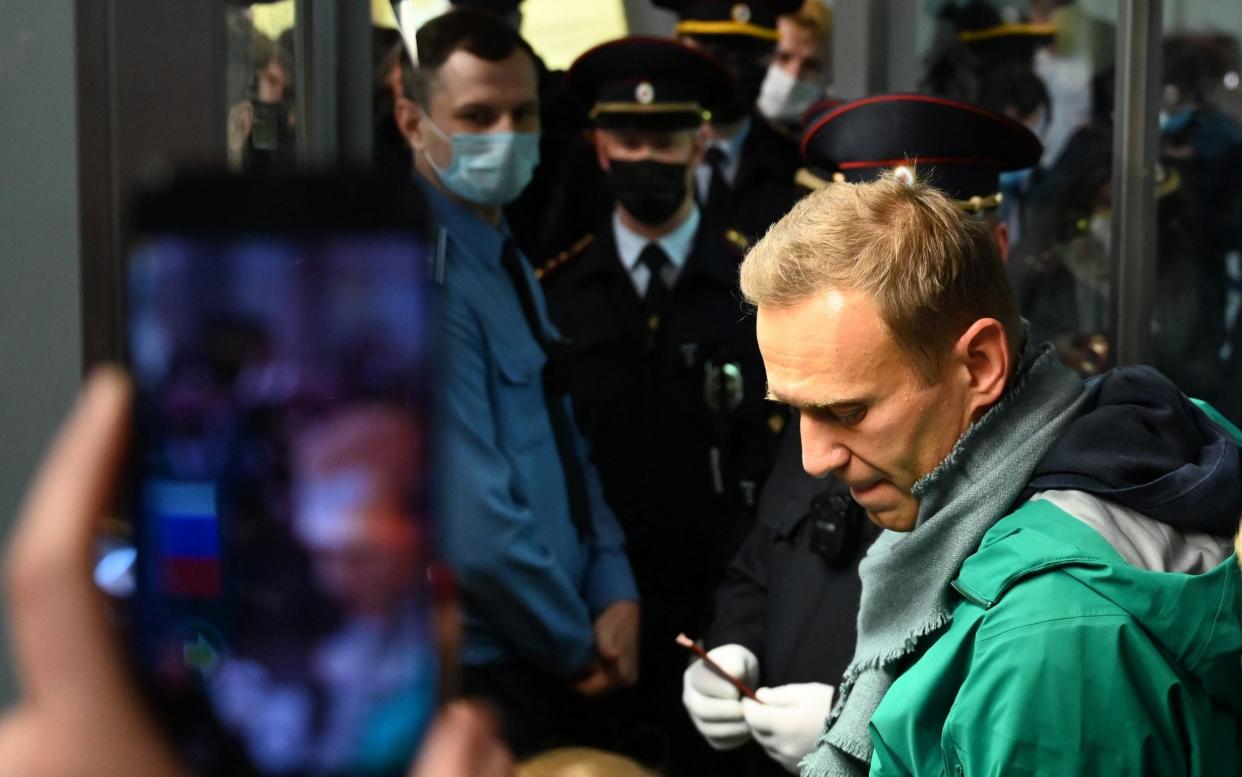Analysis: Kremlin zeroes in on Alexei Navalny, fearful of looking weak

- Oops!Something went wrong.Please try again later.
After branding him a traitor and a spy for months, the Kremlin had little choice but to arrest Alexei Navalny, the Russian opposition leader, upon return to Moscow on Sunday, fearful of appearing weak in the eyes of security services.
Mr Navalny, a trained lawyer who rose to prominence about a decade ago thanks to his investigations into official graft, has long been a thorn in the Kremlin’s side.
As his profile grew, Mr Navalny kept on receiving persistent messages from the state to stop.
He has faced charges on countless criminal inquiries, received two suspended sentences, spent months under house arrest and seen his own brother locked up for three and a half years in an apparent political vendetta.
Thousands of people took to the streets in summer 2013 when he was given a prison sentence, and the ruling was reversed less than 24 hours later in the face of mounting public discontent.
Vladimir Putin, the Russian president, has for years dismissed him as a petty criminal not worth the attention. Yet, Russian authorities stopped short of sending him to prison on one of the myriad criminal cases against him, fearing that it would only boost his following.
The situation has changed dramatically since Mr Navalny nearly died this summer from a Soviet-era military grade nerve agent.
The politician accused Mr Putin himself of ordering the attack, which independent investigative group Bellingcat linked to Russian intelligence agents who had been trailing Mr Navalny for months. Mr Putin denies the accusation.
In an acute embarrassment for the Russian intelligence community, Mr Navalny last month prank-called one of the men allegedly behind the poisoning and got him to discuss the details of the operation to kill him.
Mr Navalny has spear-headed all major protests against President Putin since 2011. He vowed to come home to Russia while he was recuperating in Germany, despite the Kremlin's threats to launch new criminal cases or jail him for violating the conditions of his suspended sentence that expired in December.
In an effort to tarnish his name in Russia, President Putin in recent months suggested that Mr Navalny was working for foreign intelligence.
Feeding into the narrative, Dmitry Kiselyov, one of Russia’s best-known state TV hosts in his flagship evening show on Sunday went as far as to suggest that Mr Navalny was sent back to Russia by German intelligence agencies. He even compared him to Vladimir Lenin, who returned to Russia from a self-imposed exile in Europe in 1917 a few months before the Bolshevik Revolution.
Mr Navalny’s embarrassing revelations about hapless Russian agents as well Mr Putin’s increasingly intransigent rhetoric left the Kremlin with no choice but to take the side of the security agencies and detain him on arrival.
“He has become an enemy who needs to be humiliated, crushed and punished,” Tatyana Stanovaya, non-resident scholar at the Moscow Carnegie Centre and head of the R.Politik political analysis firm, said on her Telegram channel on Sunday.
“Putin is clearly banking on this approach. Those supervising domestic politics (at the Kremlin) have lost their seat at the table and will now serve security services.”
Mr Navalny was formally detained on Sunday evening after Russian prison authorities claimed last month that he violated the terms of his suspended sentence by not showing up to his probation office while in Germany.
The ultimate decision whether to keep him busy fighting off new charges, detentions and harassment or send him to jail now largely depends on potential public backlash against his prosecution.
Having satisfied the security services’ initial call for blood, the Kremlin will now watch for reaction before making a big decision on Mr Navalny’s future.
To many in Russia, the fact that the plane carrying Mr Navalny back home on Sunday was suddenly re-routed from the airport filled with his supporters to another airport shows how scared the Kremlin is of any public show in his support.
“Navalny’s supporters in Russia managed to get (the authorities) to re-route the plane while in 2013 they managed to release Navalny from jail after the door of his cell shut close,” Leonid Volkov, Mr Navalny’s close ally, said on Facebook on Sunday.
“What happens next will certainly depend on Navalny’s supporters in Russia.”

